In the fast-paced HVAC industry, efficiency is everything. From scheduling jobs and dispatching technicians to managing invoices and maintaining customer relationships, the right software can make or break your business. Manual processes often lead to delays, errors, and frustrated customers, while a streamlined digital workflow boosts productivity and profitability. But with so many options available, how do you choose the best hvac service management software for your specific needs?
This comprehensive guide cuts through the noise. We provide a detailed analysis of the top 12 platforms, evaluating their core features, real-world usability, and unique strengths. Inside, you'll find direct links and screenshots for each tool, helping you visualize how they work. To truly streamline operations and maximize efficiency, understanding various workflow automation examples can be highly beneficial for your business, and the right software is the key to implementing them effectively.
Whether you're a small startup managing a few technicians or a large enterprise coordinating complex projects, this resource will help you find the perfect tool to optimize your operations. We examine everything from dispatching and invoicing to customer management and reporting, giving you the practical insights needed to make a confident decision and drive growth. Let's dive into the platforms that can transform your service delivery.
1. Work Order Management Software
ResQ's Work Order Management Software stands out as a powerful and forward-thinking solution for modernizing field service operations. It excels by integrating innovative technology directly into the core workflow, creating a highly efficient system that bridges the gap between field technicians and office administration. This platform is particularly effective as an hvac service management software because it tackles communication and asset tracking, two of the industry's most persistent challenges.
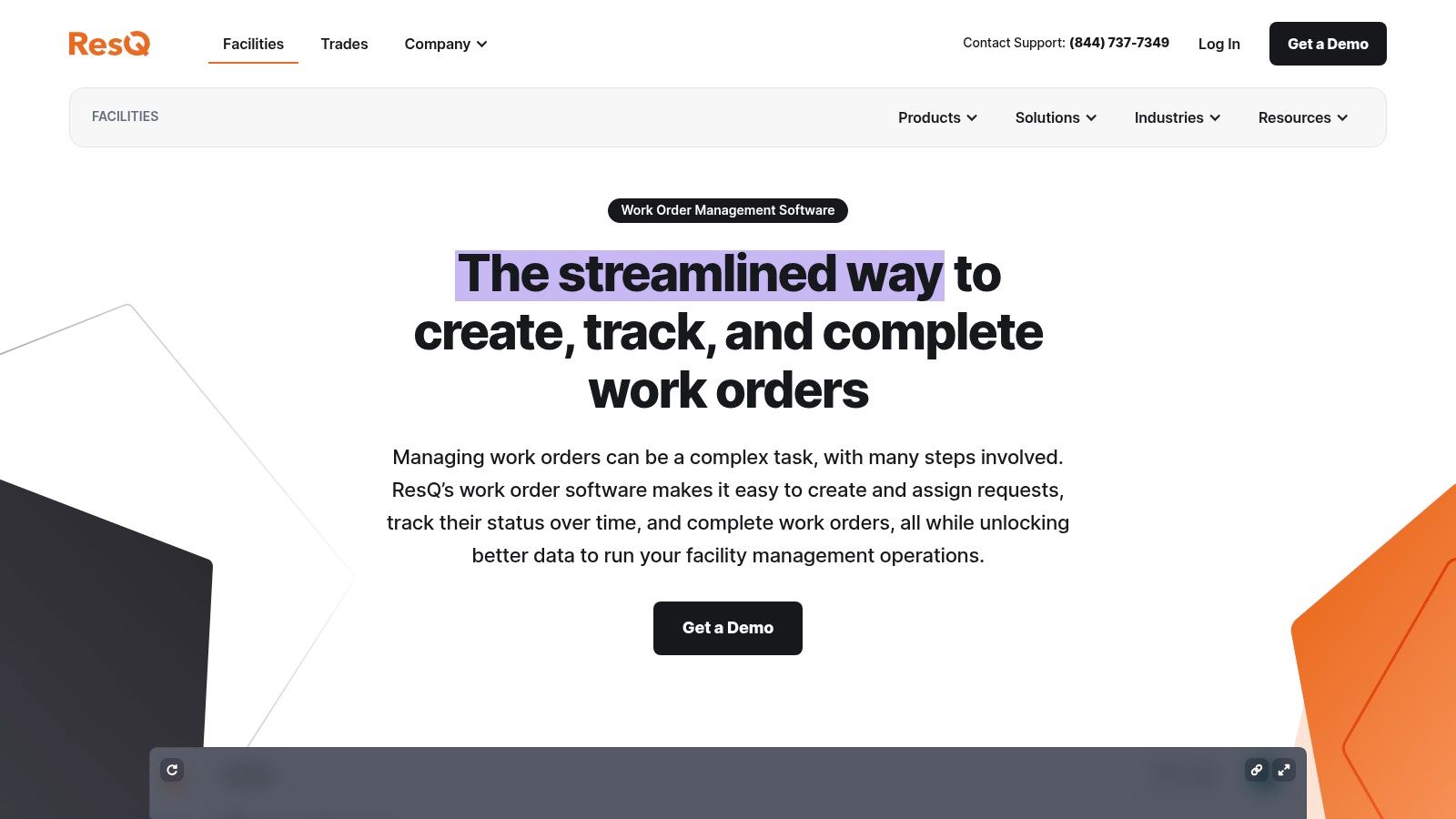
What truly sets ResQ apart is its seamless integration of QR code asset tagging with an AI-powered communication layer, Nora, which operates through WhatsApp. An HVAC technician can simply scan a QR code on a unit, instantly pulling up its entire service history and specifications. As they work, they can dictate notes and send photos via WhatsApp, which Nora intelligently transcribes and organizes directly into the work order. This eliminates manual data entry and ensures job details are captured with perfect accuracy in real-time.
Key Features & Benefits
ResQ’s platform is more than just a digital logbook; it’s a comprehensive ecosystem designed for speed and clarity. The centralized portal offers a live, transparent view of all active and completed jobs, streamlining everything from dispatch to invoicing.
- QR Code Asset Tagging: Instantly identify equipment, view service history, and reduce manual errors. This is invaluable for managing numerous client sites with diverse HVAC systems.
- AI-Powered Notes with Nora: Technicians use familiar tools like WhatsApp to dictate notes and updates, which Nora's AI automatically structures and logs. This enhances communication without requiring techs to learn a new, complex app.
- Automated Troubleshooting: The system can provide real-time guidance based on the identified asset, helping technicians resolve issues faster and reducing system downtime.
- Centralized Visibility: A single dashboard provides office staff with real-time status updates, photos, and detailed logs, accelerating the billing cycle and improving customer communication.
Practical Considerations
The software is engineered for rapid adoption, with a quick onboarding process that primarily involves linking WhatsApp to the system. While the initial setup of QR code tags on existing assets requires an upfront investment of time, the long-term efficiency gains in reduced diagnostic time and improved accuracy are substantial. Teams accustomed to traditional phone calls or fragmented text threads may need a short adjustment period to fully leverage the WhatsApp-based workflow, but the intuitive nature of the tool minimizes the learning curve.
Best for: HVAC businesses, facilities management teams, and service contractors seeking to drastically reduce administrative overhead and improve the accuracy of field reporting.
Website: Work Order Management Software by ResQ
2. ServiceTitan
ServiceTitan positions itself as the premier all-in-one software for home and commercial service businesses, making it a heavyweight contender in the HVAC service management software space. Its platform is exceptionally comprehensive, designed to manage nearly every aspect of an HVAC operation, from the initial customer call to the final invoice and performance analytics. What sets ServiceTitan apart is its deep integration of marketing and sales tools directly into the workflow, allowing businesses to track ROI on ad campaigns and empower technicians with on-site sales presentations.

The platform’s real-time dispatching board is a command center for optimizing technician routes, while the mobile app provides techs with complete customer history and digital forms. This robust functionality comes at a premium price, which can be a significant investment for smaller businesses or solo operators. However, for established HVAC companies focused on scaling operations and maximizing profitability, ServiceTitan offers a powerful, data-driven solution that few competitors can match.
Key Information & Features:
- Best For: Mid-to-large-sized HVAC companies seeking a comprehensive, scalable growth platform.
- Pricing: Custom-quoted, typically starting around $398/month per office location. Pricing is subscription-based and varies based on the number of technicians and selected features.
- Key Features: Advanced scheduling and dispatching, integrated marketing and sales tools, robust reporting and analytics, technician mobile app with pricebook and sales presentation capabilities.
- Pros: All-in-one functionality reduces the need for other software, strong focus on business growth and profitability, excellent customer support and training resources.
- Cons: Higher price point can be prohibitive for small businesses, some users report a steep learning curve due to its extensive features.
Website: https://www.servicetitan.com/
3. Housecall Pro
Housecall Pro is a highly popular HVAC service management software known for its user-friendly interface and streamlined approach to field service operations. It strikes a balance between robust functionality and simplicity, making it an accessible option for businesses that need powerful tools without an overwhelming learning curve. The platform excels at automating core tasks like scheduling, dispatching, invoicing, and payment processing, freeing up valuable time for both office staff and technicians. Its emphasis on customer communication, with automated job reminders and follow-ups, helps businesses enhance their professional image and reduce no-shows.
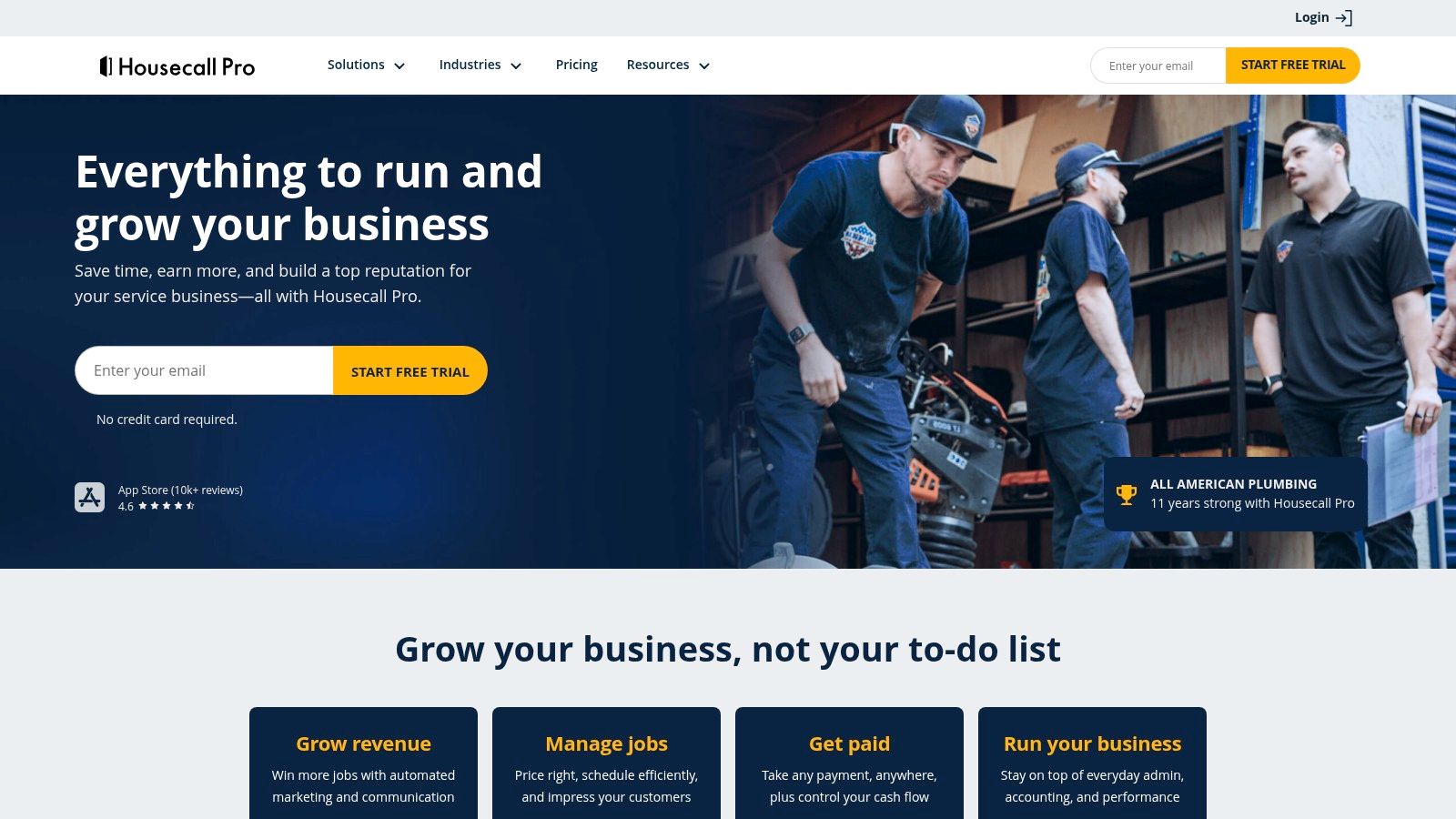
While it may not offer the same depth of customization or enterprise-level analytics as some competitors, Housecall Pro’s strength lies in its core feature set that is easy to implement and use daily. This makes it an ideal choice for small-to-mid-sized HVAC companies looking to upgrade from paper-based systems or less intuitive software. The mobile app is particularly well-regarded, providing technicians with all the necessary job details and payment processing capabilities directly in the field.
Key Information & Features:
- Best For: Small-to-mid-sized HVAC businesses and owner-operators prioritizing ease of use and strong mobile functionality.
- Pricing: Starts at $65/month for one user with the Basic plan. Higher tiers (Essentials and Max) are custom-quoted and add more advanced features.
- Key Features: Drag-and-drop scheduling, real-time dispatching, integrated payment processing and financing options, automated customer notifications and review management.
- Pros: Very intuitive and user-friendly mobile app, strong automation for customer communication, competitive and transparent pricing for smaller teams.
- Cons: Advanced features like reporting and payroll integration are often locked behind higher-priced tiers, limited customization for unique or complex workflows.
Website: https://www.housecallpro.com/
4. FieldEdge
FieldEdge is a powerful HVAC service management software solution with deep roots in accounting, originating as an add-on for QuickBooks. It has since evolved into a comprehensive, standalone field service management platform. Its core strength lies in its ability to streamline operations from dispatch to payment, with a particular emphasis on robust financial integration. The software is designed to connect the office with technicians in the field, ensuring seamless communication and real-time data flow.
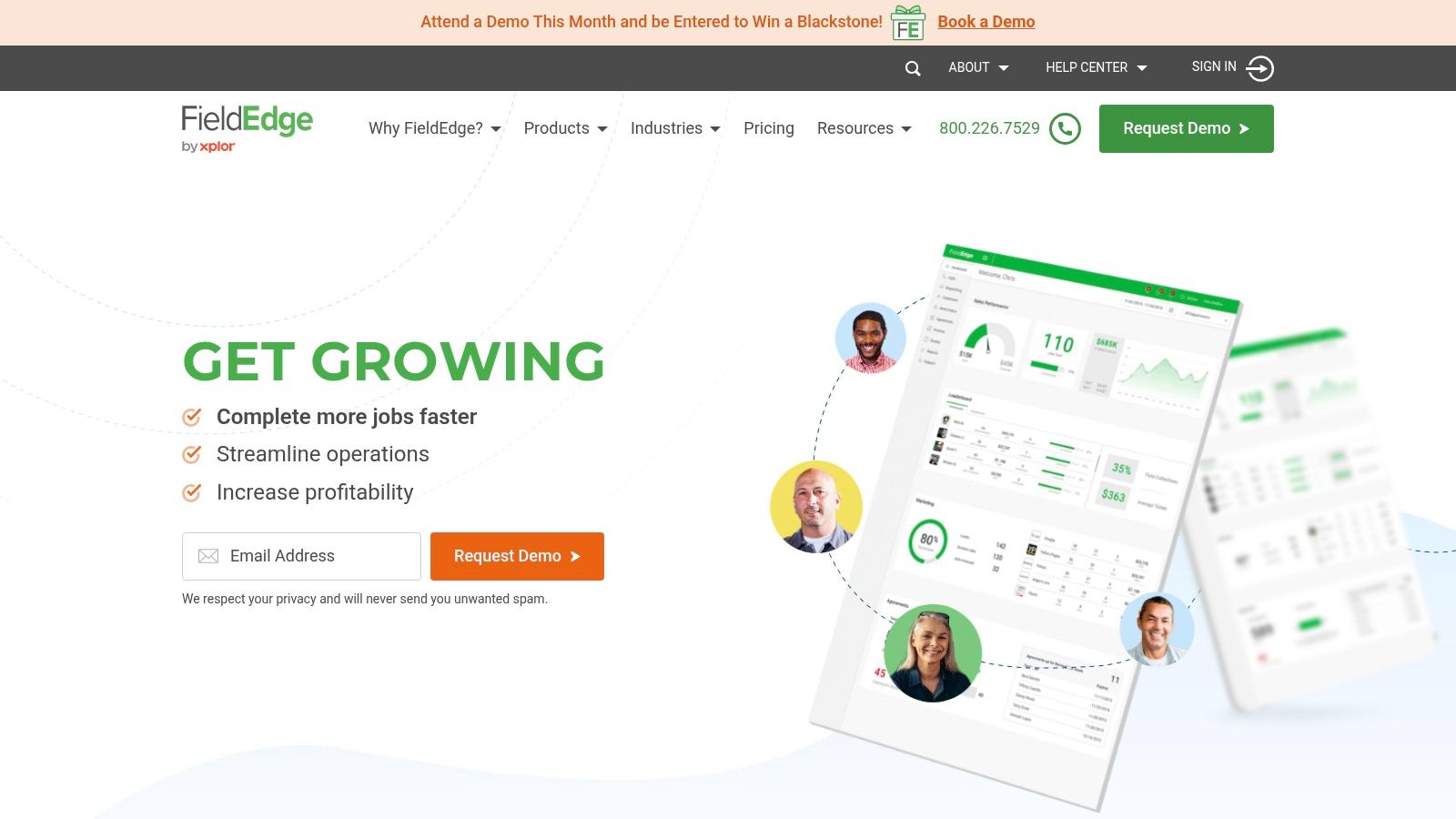
The platform’s real-time dispatching board, enhanced with GPS tracking, allows managers to monitor technician locations and optimize schedules for maximum efficiency. For businesses heavily reliant on QuickBooks for their accounting, FieldEdge offers one of the most seamless integrations on the market, eliminating double-entry and simplifying financial reporting. While the initial setup can be time-intensive, its detailed customer management and powerful mobile capabilities make it a strong contender for HVAC businesses looking to tighten operational control and improve financial clarity.
Key Information & Features:
- Best For: HVAC businesses of all sizes that use QuickBooks and need strong financial integration alongside field service tools.
- Pricing: Custom-quoted based on the number of users and specific business needs. Pricing details are not publicly listed and require a consultation.
- Key Features: Real-time dispatching with GPS tracking, native QuickBooks Desktop and Online integration, mobile app for job management and payment processing, comprehensive customer history and equipment tracking.
- Pros: Exceptional and deep QuickBooks integration, powerful real-time technician tracking and dispatching, extensive customer and equipment management features.
- Cons: Pricing is not transparent and requires a sales call, the initial setup and data migration process may require a significant time investment.
Website: https://www.fieldedge.com/
5. Jobber
Jobber has carved out a significant niche as a highly accessible and user-friendly HVAC service management software, particularly favored by small to medium-sized businesses. Its core strength lies in streamlining the entire customer journey, from initial contact to final payment, with an emphasis on clear communication and simplicity. The platform excels at making complex operations like scheduling, quoting, and invoicing straightforward, removing many of the administrative headaches that growing companies face.
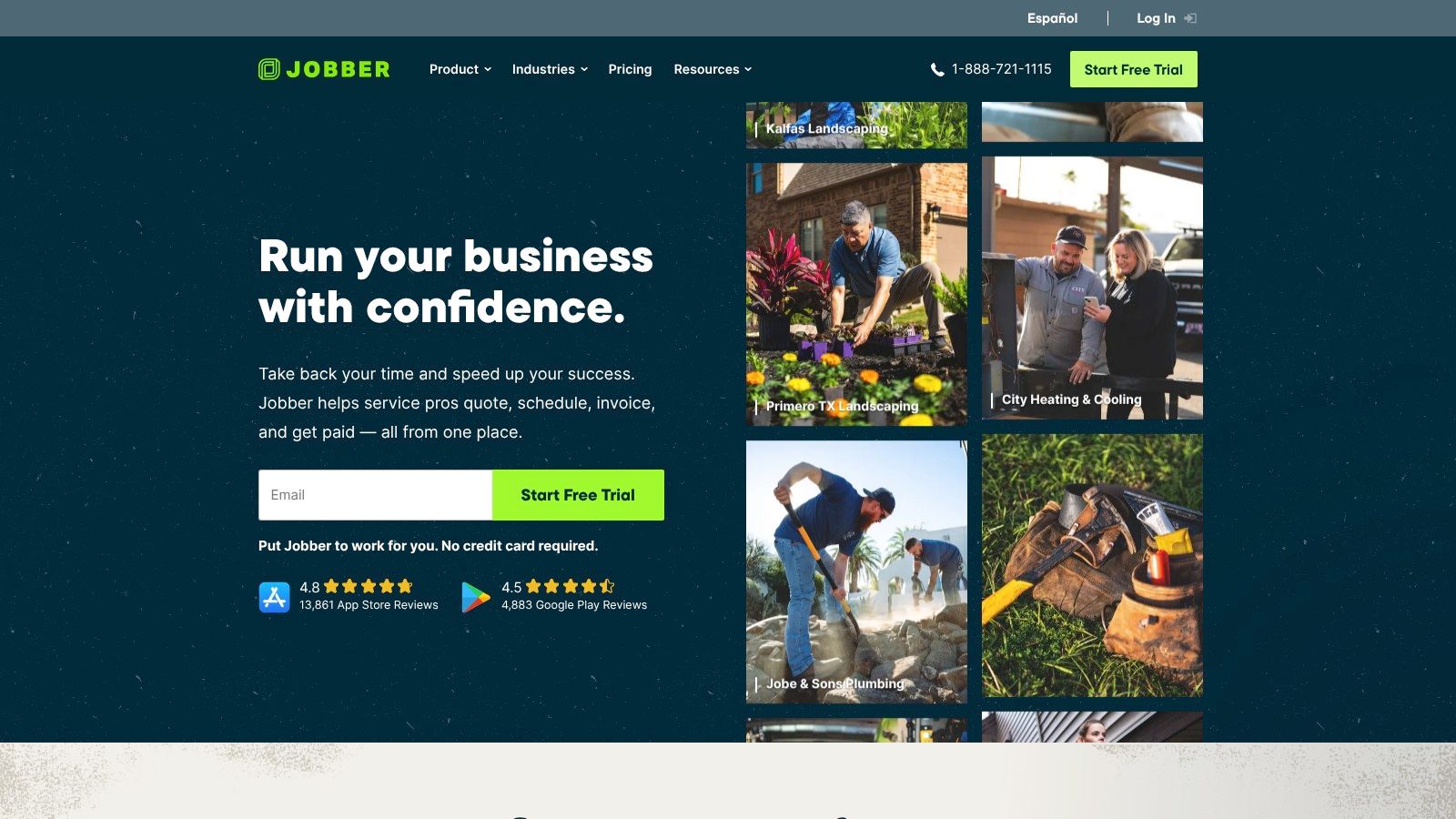
What distinguishes Jobber is its powerful client hub, which provides customers a self-service portal to approve quotes, check appointment details, and make payments online. This feature not only improves the customer experience but also significantly reduces administrative follow-up time for office staff. While it may not offer the deep, enterprise-level analytics of some competitors, Jobber provides an exceptional balance of essential features, affordability, and ease of use, making it an ideal starting point for businesses looking to professionalize their operations without a steep learning curve or prohibitive cost.
Key Information & Features:
- Best For: Small to mid-sized HVAC businesses and startups needing a user-friendly, all-around solution with strong client-facing features.
- Pricing: Offers tiered plans. The "Core" plan starts at $69/month, with "Connect" and "Grow" plans offering more features at higher price points (typically $169/month and $349/month, respectively).
- Key Features: Online booking and scheduling, intuitive drag-and-drop calendar, client hub for self-service, quoting and invoicing with automated follow-ups, mobile app for technicians.
- Pros: Very intuitive and easy-to-learn interface, excellent client communication tools, affordable and transparent pricing plans.
- Cons: Reporting capabilities are less advanced than some enterprise-level platforms, limited customization options for quotes and invoices.
Website: https://getjobber.com/
6. Service Fusion
Service Fusion enters the market as a powerful, all-in-one field service management solution that strongly emphasizes operational efficiency and customer engagement. Designed for growing HVAC businesses, it combines essential tools like scheduling, dispatching, and invoicing with more advanced features such as GPS fleet tracking and a customer-facing portal. This blend makes it a compelling piece of HVAC service management software for companies looking to streamline their entire workflow, from the initial job booking to final payment collection.
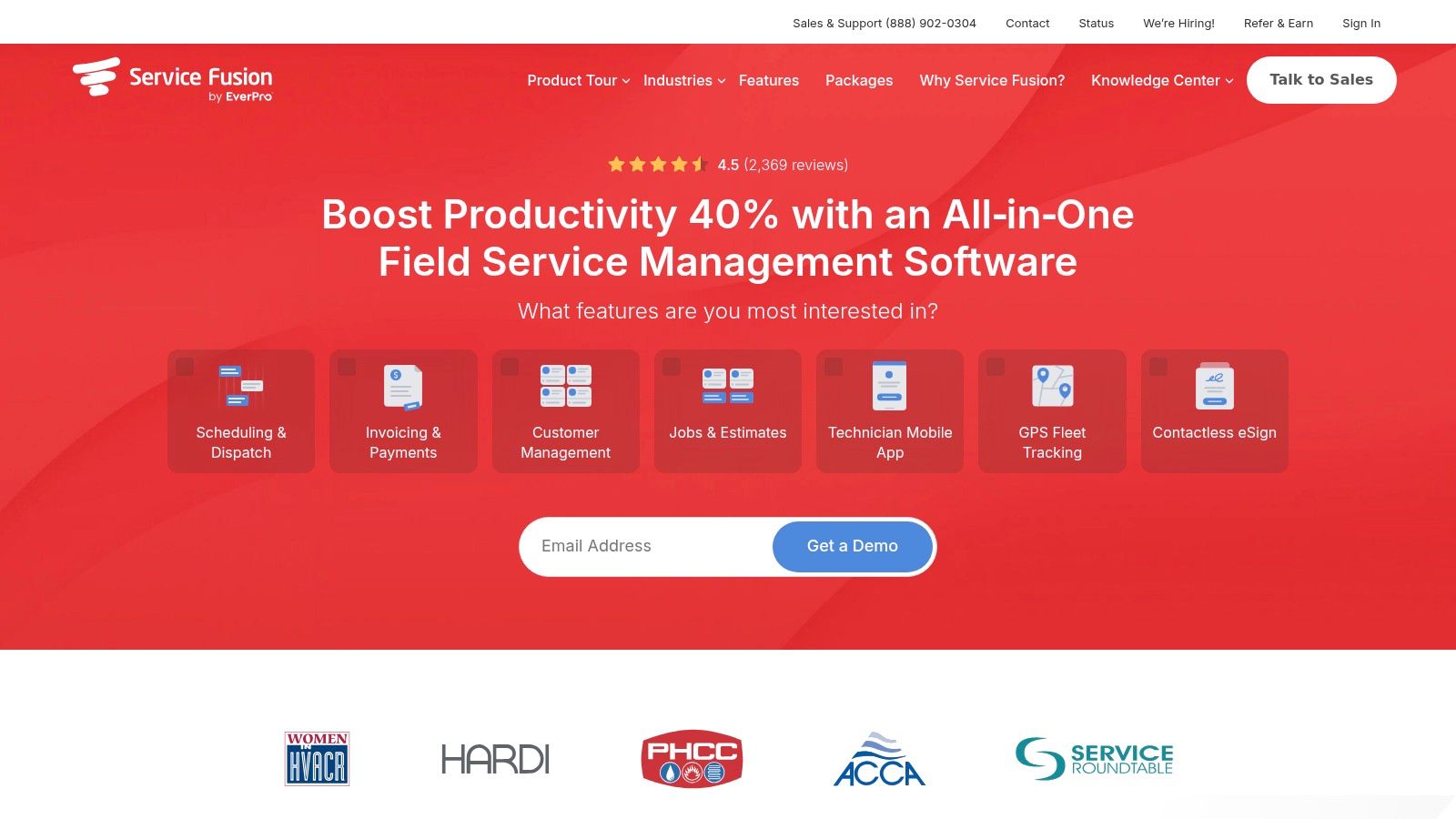
What distinguishes Service Fusion is its flat-rate pricing model, which avoids per-user fees and makes it a cost-effective choice for businesses with a large number of technicians. The platform’s “Field-Link” mobile app empowers technicians with job details and payment processing, while the “Customer Portal” allows clients to view service history and request new jobs. While some users note limitations in certain feature sets compared to top-tier competitors, its comprehensive offering and predictable pricing provide significant value for small to mid-sized HVAC contractors aiming to improve organization and customer communication.
Key Information & Features:
- Best For: Small to mid-sized HVAC companies looking for a full-featured solution with predictable, flat-rate pricing.
- Pricing: Offers tiered plans (Starter, Plus, Pro) starting at $126/month. Pricing is based on features, not the number of users, making it scalable.
- Key Features: GPS fleet tracking, unlimited user access, customer portal for job requests and history, quoting and invoicing, robust mobile app for technicians.
- Pros: Flat-rate pricing is budget-friendly for larger teams, comprehensive feature set covers most operational needs, strong mobile and customer-facing applications.
- Cons: Some advanced features may be less polished than premium alternatives, the interface can feel less intuitive for new users.
Website: https://www.servicefusion.com/
7. Workiz
Workiz targets the growing field service business, including HVAC contractors, with a user-friendly and highly customizable platform. It distinguishes itself by offering a genuinely useful free plan for up to two users, making it an excellent entry point for new businesses or small teams testing out HVAC service management software. The platform covers all the essential bases, from drag-and-drop scheduling and dispatching to invoicing and online payment processing, all wrapped in an intuitive interface that simplifies daily operations.
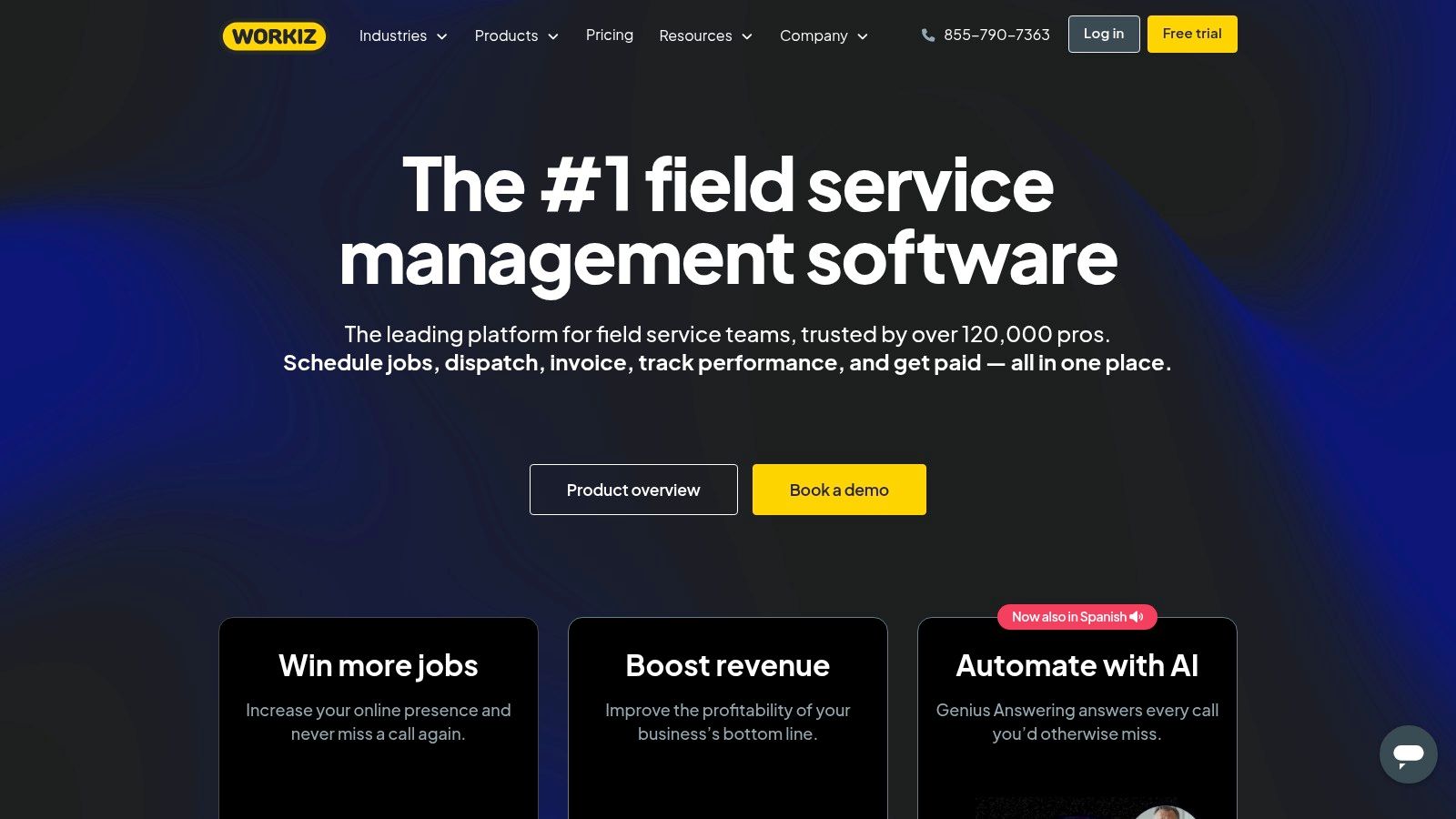
While Workiz may not have the extensive enterprise-level analytics of some top-tier competitors, its strength lies in its accessibility and ease of use. It allows HVAC businesses to professionalize their operations quickly with features like custom job fields, automated customer notifications, and integrated phone service. For companies prioritizing simplicity, fast implementation, and a budget-friendly starting point without sacrificing core functionality, Workiz presents a compelling and scalable option.
Key Information & Features:
- Best For: Small-to-mid-sized HVAC businesses and startups looking for a user-friendly, affordable, and scalable solution.
- Pricing: Offers a free plan for up to 2 users. Paid plans start at $225/month for the Core plan, with custom pricing for the Ultimate plan.
- Key Features: Drag-and-drop scheduling, invoicing and payment processing, inventory management, integrated phone system (Workiz Phone), and customizable job fields.
- Pros: Very easy to use with a minimal learning curve, offers a functional free plan, highly customizable to fit specific business workflows.
- Cons: The free plan has limited advanced features, and some users have reported occasional technical glitches or bugs.
Website: https://www.workiz.com/
8. ServiceTrade
ServiceTrade carves out a specific niche within the HVAC service management software landscape by focusing intensely on the commercial sector. Its platform is engineered to elevate the customer experience, moving beyond simple scheduling to create transparent and professional service interactions. ServiceTrade excels at providing clients with detailed, media-rich service reports, online service portals, and automated communications, which helps commercial contractors build trust and secure long-term service agreements. This focus on documentation and client-facing tools makes it a powerful asset for businesses where compliance and detailed service history are paramount.

The platform streamlines operations from quote to final invoice, with robust tools for managing preventative maintenance contracts and complex, multi-location jobs. While its extensive feature set offers significant advantages, it may require a dedicated training period for teams to fully leverage its capabilities. For commercial HVAC companies aiming to differentiate themselves through superior customer service and operational transparency, ServiceTrade provides a specialized and highly effective solution that strengthens client relationships and drives recurring revenue.
Key Information & Features:
- Best For: Commercial HVAC and mechanical contractors focused on service agreements and customer retention.
- Pricing: Quote-based. Pricing is customized based on the number of technicians and office staff using the platform.
- Key Features: Customer service portals, detailed digital service reports with photos and audio, automated scheduling and dispatching, robust quote and preventative maintenance management.
- Pros: Strong emphasis on enhancing the commercial customer experience, excellent for managing service contracts, powerful reporting and documentation tools.
- Cons: Pricing is not publicly available, and the extensive feature set can present a learning curve for new users.
Website: https://www.servicetrade.com/
9. FieldPulse
FieldPulse is a dynamic field service management software that strikes a crucial balance between robust functionality and user-friendly accessibility. It is engineered for HVAC contractors who need a comprehensive toolset without the steep learning curve or high costs associated with more complex enterprise-level systems. The platform provides a solid foundation for managing daily operations, including job scheduling, dispatching, invoicing, and maintaining detailed customer records, all within a clean and intuitive interface.
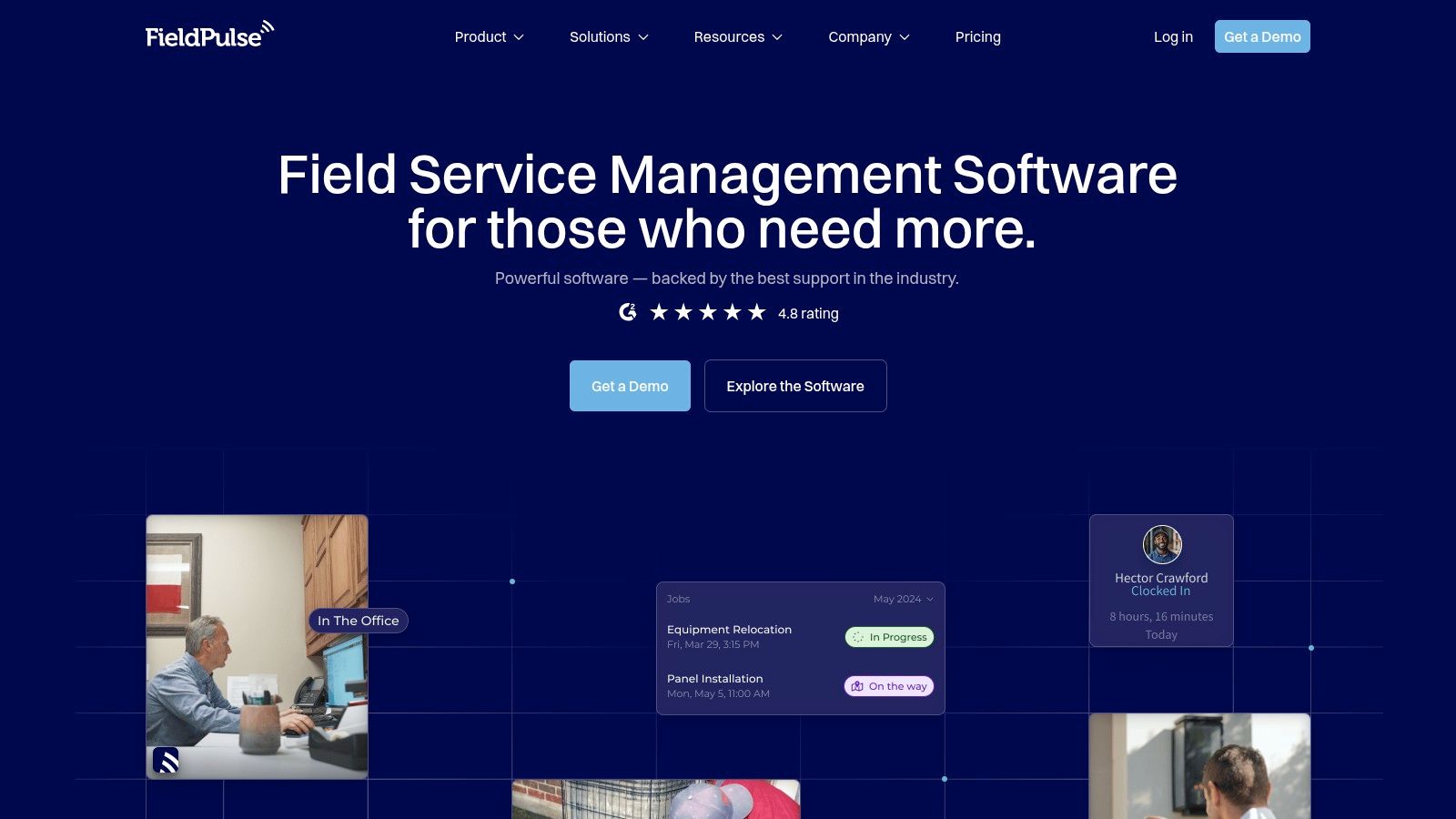
What makes FieldPulse a strong contender is its affordability and straightforward approach to HVAC service management software. It’s an ideal solution for small-to-mid-sized businesses looking to transition from paper-based methods or less integrated digital tools. While it may lack some of the advanced, high-level analytics of premium competitors, its core features are powerful enough to significantly streamline workflows, improve communication between the office and field, and professionalize customer interactions from estimate to final payment.
Key Information & Features:
- Best For: Small-to-mid-sized HVAC companies and owner-operators needing an affordable, all-in-one management solution.
- Pricing: Plans start at $99/month, with different tiers available based on the number of users and desired features. A free trial is available.
- Key Features: Job scheduling and dispatching, customer management (CRM), estimating and invoicing, mobile payment processing, and timesheets.
- Pros: Very user-friendly interface that is easy to adopt, comprehensive feature set for its price point, affordable and transparent pricing plans.
- Cons: Some users have reported occasional bugs or glitches in the mobile app, and it may lack the deep, advanced features required by larger, enterprise-level operations.
Website: https://www.fieldpulse.com/
10. mHelpDesk
mHelpDesk provides a solid, straightforward field service management solution that is particularly well-suited for small to mid-sized HVAC businesses looking for core operational features without excessive complexity. It covers all the essential bases, from initial customer contact and quoting to final invoicing and payment processing. A key differentiator for mHelpDesk is its strong focus on workflow automation and a clean, user-friendly interface that simplifies daily tasks for both office staff and technicians in the field.
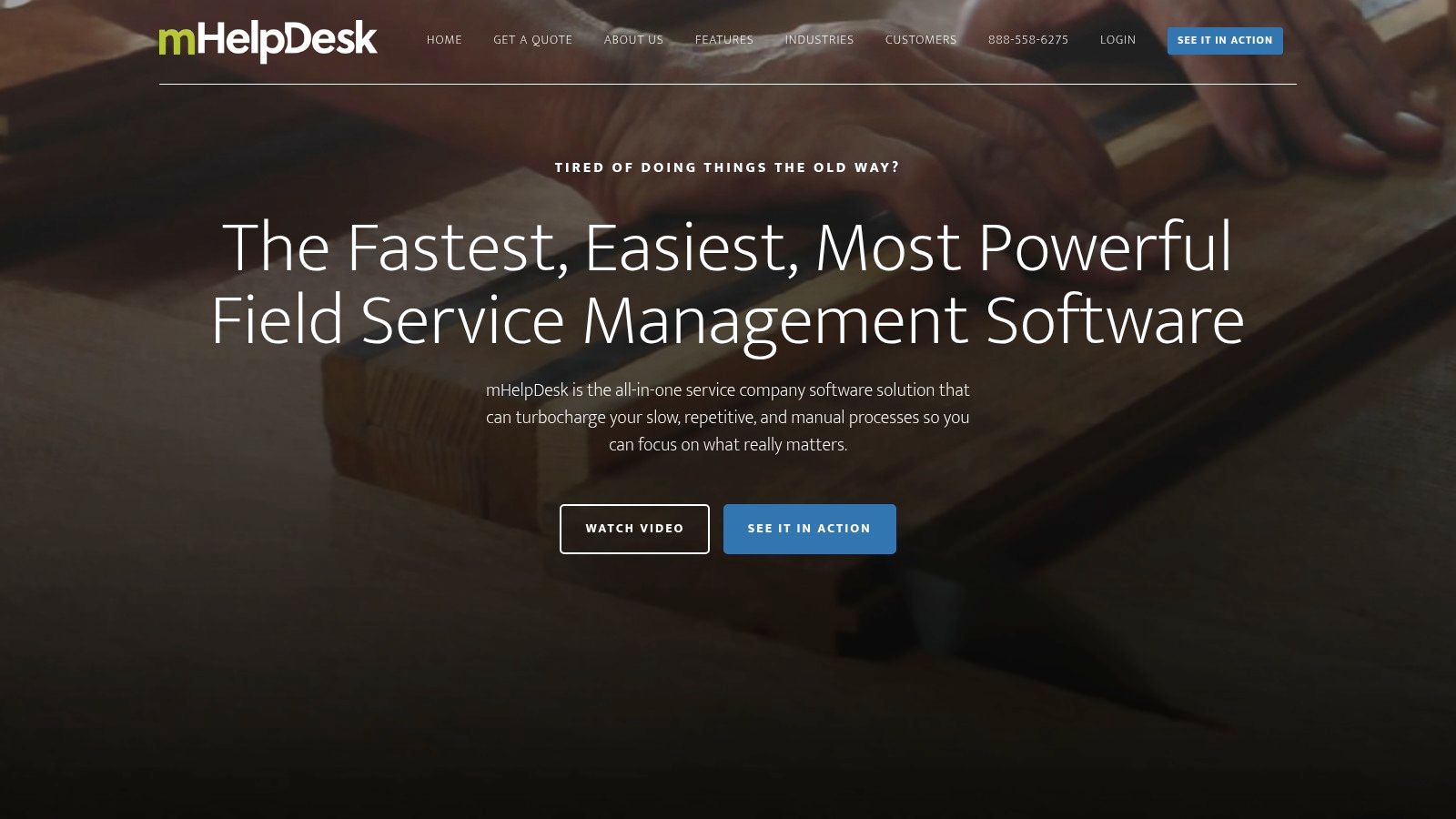
The platform’s seamless integration with QuickBooks is a major advantage, streamlining accounting processes and eliminating double data entry. While it may not have the advanced, growth-focused marketing tools of some premium competitors, mHelpDesk excels at providing a reliable system for managing jobs, tracking work orders, and getting paid faster. This makes it an effective piece of hvac service management software for companies prioritizing efficiency and organization over aggressive expansion features. Some users have noted occasional glitches, but its overall value for the price is strong.
Key Information & Features:
- Best For: Small to mid-sized HVAC businesses needing a reliable, all-in-one system with strong QuickBooks integration.
- Pricing: Custom-quoted based on business size and needs. Plans are subscription-based, often starting around $150 per month.
- Key Features: Customer relationship management (CRM), scheduling and dispatching, quoting and invoicing, offline mobile app access, and seamless QuickBooks integration.
- Pros: Very efficient invoicing and payment process, strong work order tracking capabilities, excellent integration with QuickBooks simplifies accounting.
- Cons: Some users have reported bugs and occasional system glitches, and the reporting features can be less robust than more expensive alternatives.
Website: https://www.mhelpdesk.com/
11. UpKeep
While many platforms focus on residential service calls, UpKeep distinguishes itself as a maintenance-first asset management platform, making it a strong choice for HVAC companies that handle extensive commercial contracts or manage large inventories of equipment. It excels at systematizing preventive maintenance, tracking work orders against specific assets, and managing parts inventory. This focus makes it a specialized piece of HVAC service management software, ideal for businesses where long-term equipment health and uptime are the primary revenue drivers, rather than one-off residential jobs.
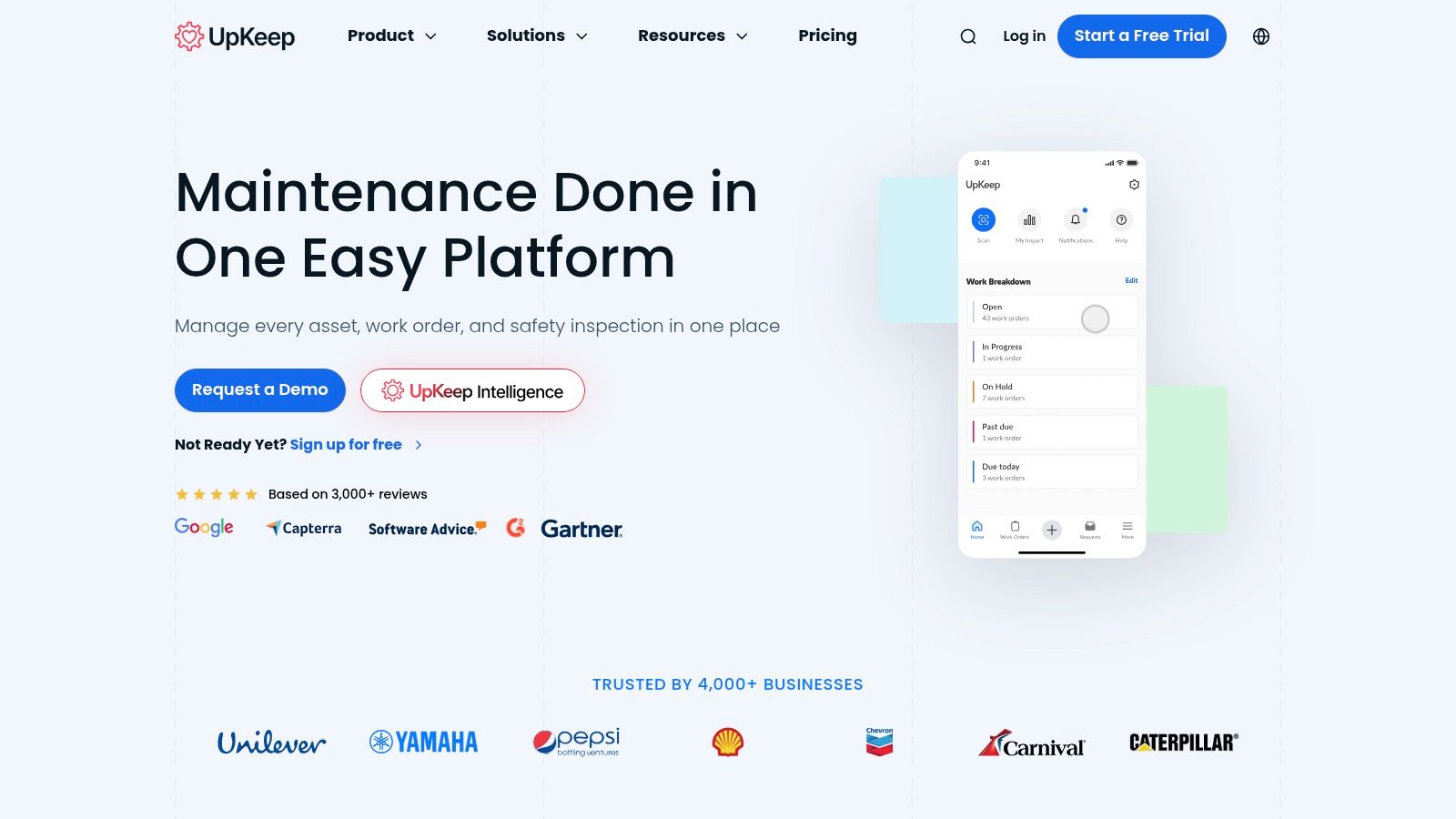
UpKeep’s mobile-first design empowers technicians to update work orders, log parts used, and access asset history directly from the field, which is crucial for efficiency in commercial settings. Its user-friendly interface simplifies complex maintenance schedules into actionable tasks. While it may lack the robust, sales-focused CRM and marketing tools of competitors like ServiceTitan, its strength in asset lifecycle management and preventive maintenance analytics provides a clear operational advantage for maintenance-heavy HVAC businesses.
Key Information & Features:
- Best For: Commercial HVAC contractors focused on preventive maintenance contracts and asset management.
- Pricing: Offers multiple tiers, including a free plan for individuals. Paid plans start at $45/month per user for the Starter package, with more advanced features available in higher-tier plans.
- Key Features: Asset and work order management, preventive maintenance scheduling, parts and inventory tracking, robust reporting on maintenance history, strong mobile app for technicians.
- Pros: Excellent for managing maintenance schedules, user-friendly and mobile-first interface, powerful analytics and reporting tools for asset performance.
- Cons: Less focused on customer-facing features like quoting and invoicing for residential jobs, some users report limitations in customization options.
Website: https://www.upkeep.com/
12. Vonigo
Vonigo offers a flexible, cloud-based platform designed to streamline the entire service lifecycle for HVAC businesses. Its strength lies in its modular approach and customizable workflows, allowing companies to tailor the software to their specific operational needs. From a branded online booking engine that integrates directly into a company's website to sophisticated work order management and dispatching, Vonigo provides a solid foundation for managing day-to-day activities. It aims to connect every step, from the initial customer request to the final payment, in a single, cohesive system.
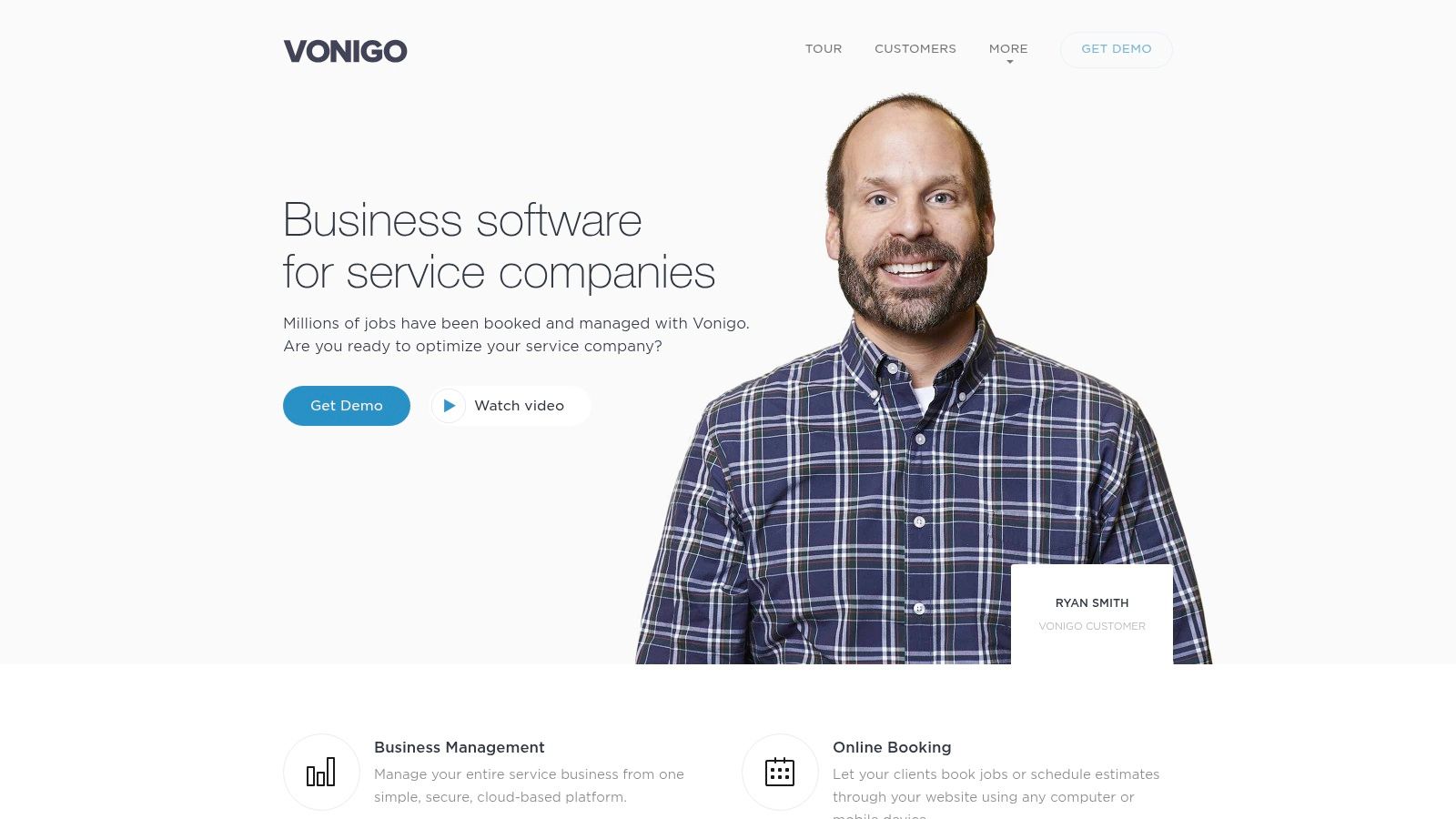
This platform is particularly useful for businesses that need more than a one-size-fits-all solution. While some of its features can feel geared toward property management or franchise models, its core functionality as an HVAC service management software is robust. The user-friendly interface helps reduce the learning curve, though a proper initial setup is crucial to leverage its full potential. For HVAC companies that value adaptability and require strong third-party integration capabilities, Vonigo presents a compelling and scalable option.
Key Information & Features:
- Best For: HVAC businesses of all sizes that require highly customizable workflows and strong online booking capabilities.
- Pricing: Custom-quoted. Plans typically start around $98 per user, per month, with pricing varying based on features and user count.
- Key Features: Integrated online booking engine, customizable work order management, drag-and-drop dispatching, invoicing and payments, route optimization.
- Pros: Highly customizable workflows, strong support for third-party integrations, user-friendly and intuitive interface.
- Cons: Requires dedicated time for initial setup and customization, some advanced features may be more aligned with property management needs.
Website: https://www.vonigo.com/
Key Feature Comparison of Top 12 HVAC Service Software
Making Your Final Decision and Enhancing Your Workflow
Selecting the ideal HVAC service management software is a foundational decision that will shape your operational efficiency, technician productivity, and ultimately, your bottom line. We've navigated a landscape of powerful tools, from comprehensive, enterprise-level platforms like ServiceTitan and FieldEdge to more agile and user-friendly options for smaller teams, such as Jobber and Housecall Pro. Your perfect match depends less on finding a single "best" platform and more on identifying the software that aligns precisely with your unique business needs, size, and growth ambitions.
The key takeaway is that the right software should solve your most pressing problems. If scheduling chaos is your biggest headache, a tool with a robust, visual dispatch board like Service Fusion or Workiz might be your priority. If improving first-time fix rates and asset management is critical, a solution with detailed service history and equipment tracking, like ServiceTrade or UpKeep, deserves a closer look.
A Framework for Your Final Choice
Before committing to a long-term contract, move beyond feature lists and consider the practical realities of implementation and daily use. A systematic approach will prevent buyer's remorse and ensure a smooth transition for your entire team.
Here are the crucial factors to weigh:
- Business Size and Scalability: Are you a one-person operation or a multi-location enterprise? Choose a platform like FieldPulse that can grow with you, but avoid overpaying for enterprise features you won't use for years.
- Technician Adoption: The most advanced software is useless if your field team finds it cumbersome. Prioritize a clean, intuitive mobile app. Consider platforms known for their user-friendly interfaces to ensure your technicians can easily update job statuses, upload photos, and access service histories on-site.
- Integration Ecosystem: Your hvac service management software should not exist in a silo. Evaluate its ability to connect with your accounting software (like QuickBooks), payment processors, and other essential business tools. This creates a unified system that eliminates double data entry and streamlines administrative tasks.
- Implementation and Support: What level of support is offered during the onboarding process? Look for providers that offer dedicated implementation specialists and responsive customer service. A smooth rollout is critical for minimizing disruption and maximizing your return on investment from day one.
Enhancing Your Software with Smarter Data Capture
Remember, the true power of any field service management platform is fueled by the quality and timeliness of the data it receives from the field. Inaccurate or delayed job notes from technicians can undermine the very efficiency you seek to create. This is where augmenting your chosen software becomes a strategic advantage.
By integrating a tool like Nora, you empower technicians to log detailed updates through a simple, familiar interface like WhatsApp. This AI-powered transcription ensures that every piece of information, from parts used to customer conversations, is captured accurately and fed directly into your management system. This vital link enhances any of the platforms we've reviewed, accelerating invoicing, improving operational visibility, and creating a truly connected workflow between your office and field teams.
Ready to eliminate messy, incomplete job notes and supercharge your new management platform? Discover how Nora uses AI to capture perfect field data via WhatsApp, ensuring your system of record is always accurate and up-to-date. Learn more about Nora and see how it can complement your chosen HVAC service management software.











